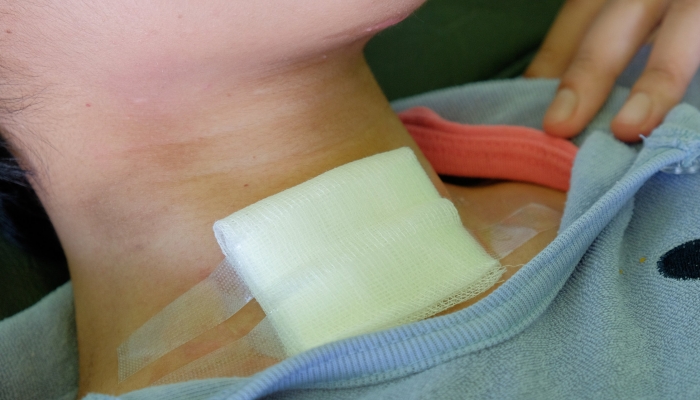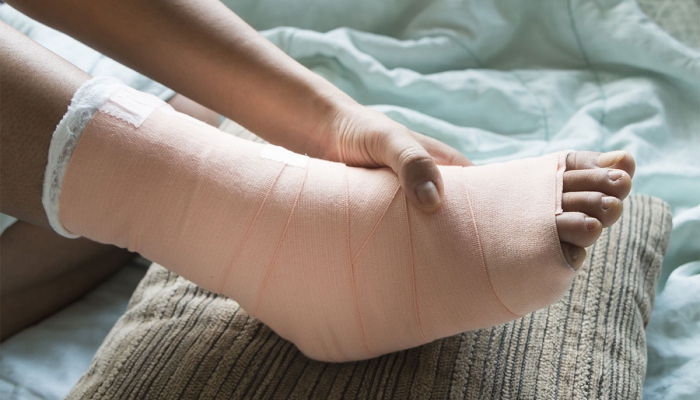What Happens When Bunions Are Left Untreated
A bunion is a prominent bump on the side of the big toe that usually develops from wearing ill-fitted shoes frequently, or from prolonged pressure being applied to the joint at the base of the foot. Depending on the shape or size of feet, some individuals may be more likely to develop bunions than others. Although there are home remedies that could work at mitigating large and small bunions (bunionettes), surgery is typically the best option.
Bunion surgery may be necessary for those who experience intense, debilitating foot pain that interferes or limits everyday activities. At Specialty Surgical Center, our specialists can remove your bunion by fusing the big toe joint, reshaping or removing the metatarsal head (bump on toe joint), or by surgically cutting and realigning the big toe joint. Other methods may be required depending on the patient’s specific case.
If left untreated, a bunion can cause arthritis, especially if the joint in the big toe has sustained extensive, long-term damage. Bunions may cause the cartilage in the joint to deteriorate. While bunions can be remedied through surgery, arthritis and the possibility of chronic pain are not curable. However, there are interventional treatment options that could help with discomfort.
Crossover toe is another problem people may encounter if they do not seek the surgery they need. When you have crossover toe, the second toe sits on top of your big toe. While it is usually caused by an irregular foot structure, having an untreated bunion puts you at greater risk of developing crossover toe.
These are just a few of the complications that could occur if patients do not receive the surgery or treatment they need. On top of increased risks of this condition, quality of life could also go down. Bunions have a reputation for getting worse over time, which could lead to various inconveniences like having the toes rub against each other causing pain while walking, or the inability to wear shoes that fit.
Inflammation from a bunion puts you at risk of developing other conditions and pain. If you’d like to have your bunion evaluated and surgically removed, please do not hesitate to contact one of our orthopedic surgeons who specialize in foot and ankle surgeries.
Specialty Surgical Center is located in Sparta, New Jersey and our staff consists of board certified surgeons and anesthesiologists performing procedures in Orthopedics, Sports Medicine, Spinal Care, Podiatry, Urology, Pain Management, ENT, Hand Surgery, Lithotripsy, Brachytherapy, GYN and Laser Surgery.
For more information about Specialty Surgical Center, call 973-940-3166 or visit our Contact Page.
Surgery Care for Children
When children come in for surgery at Specialty Surgical Center, it is normal for both children and the parents to be nervous. We know that parents are the usually the best comforting mechanism, so we allow parents to be with their child in the recovery room as soon as it is medically safe. Our wonderful team of Pediatric Advanced Life Support (PALS) certified doctors and nurses will take great care of your child. To further ease the minds of our parent patients, we made a child care guide so parents feel knowledgeable and prepared before they bring their child to Specialty Surgical Center.
In order to ease everyone’s nerves, you may schedule a tour of our facilities. Sometimes seeing that it isn’t scary helps children sleep better the night before and helps them feel more comfortable. Having a fun night before the surgery also helps to ease nerves because the child is distracted from thoughts about surgery.
Before the surgery, we ask that you do not give your child food or drinks. A nurse will call you before your appointment and let you know just how many hours before the procedure the child should stop eating, because it depends on the type of surgery. Even if the child is uncomfortable, it is vital that you do not give in and give your child food or drink. Under anesthetic, your child’s swallowing muscles become relaxed and they could aspirate (See: Why You Need to Fast Before Surgery). You should bring:
- Medical insurance cards
- A list of medications the child is on and their dosages
- Current immunization records
- Items to make your child more comfortable
Sometimes, we allow the patients to be in the operating room with the patient. However, those are special cases and it is up to the surgeon and anesthesiologist to decide if they will allow you there. Otherwise, we encourage parents to stay in the waiting room because that is the first place our receptionist or doctors will look for you to give updates.
After the surgery, your child will be moved to the PACU, also known as the recovery room. At first, only one parent will be allowed to enter the PACU, but once the child is moved into Stage II Recovery, both parents may stay with the child. Please be prepared and know that your child may still be hooked up to an IV, be wearing an oxygen mask and be connected to a monitor. Siblings or other children will not be allowed in the PACU, so please make other accommodations. Once they get home, our doctors recommend plenty of rest! Your child may be hungry since they couldn’t eat the night before, but be sure to give light meals because anesthesia may cause queasiness.
Specialty Surgical Center is located in Sparta, New Jersey and our staff consists of board certified surgeons and anesthesiologists performing procedures in Orthopedics, Sports Medicine, Spinal Care, Podiatry, Urology, Pain Management, ENT, Hand Surgery, Lithotripsy, Brachytherapy, GYN and Laser Surgery.
For more information about Specialty Surgical Center, call 973-940-3166 or visit our Contact Page.
Why Smoking Complicates Surgery
While the chances of developing a surgical complication or post-operative condition is rare, it is possible for patients to aspirate, develop an infection, or have a bad reaction to anesthesia during their surgery. At Specialty Surgical Center, we specialize in minimally invasive surgeries because they often produce less pain, a shorter hospital stay, less scarring, minimal injury to tissue, and a higher accuracy rate compared to open surgeries. Despite the many benefits of minimally invasive surgery, there is one factor we cannot control when it comes to reducing a patient’s risk of complication: smoking.
Having a smoker’s lung makes it increasingly difficult for patients to be put under anesthesia because the lungs cannot function at their maximum potential. Additionally, although cigarettes are known for their detrimental effects on the lungs, they also negatively impact blood.
Blood is a vital part of healing after surgery, so when it is hindered due to cigarette smoke, the likelihood of a post-operative complication increases. This includes having a blood clot, or worse, a heart attack following a surgical procedure. Having blood that is less healthy due to smoking also affects a surgical incision’s ability to heal.
A study in the Oxford Journals found that people who stop smoking 4-6 weeks before surgery significantly reduced their risk of infection. People who do not smoke 6-8 weeks before their surgery also lower their risk of developing lung-related complications. However, one study found patients who only abstain from smoking for 1-3 weeks prior to surgery did not lower their risk of a surgical complication at all.
Our team encourages those who smoke to quit at least 4-6 weeks before and after their procedure, if not completely. Many patients may have the mindset that they’ve smoked for a long time, so the damage is already done. In reality, the body is always healing and most patients experience tremendous health improvements after quitting. At the very least, we recommend stopping for a few weeks before your surgery to reduce your risk of complications. If over-the-counter products have not helped you quit smoking, please talk to your physician about more effective ways to quit smoking for good.
Specialty Surgical Center is located in Sparta, New Jersey and our staff consists of board certified surgeons and anesthesiologists performing procedures in Orthopedics, Sports Medicine, Spinal Care, Podiatry, Urology, Pain Management, ENT, Hand Surgery, Lithotripsy, Brachytherapy, GYN and Laser Surgery.
For more information about Specialty Surgical Center, call 973-940-3166 or visit our Contact Page.
Penile Prostheses For Erectile Dysfunction

Erectile dysfunction, also called ED, is a condition that makes it difficult for men to get or maintain an erection. According to the Urology Care Foundation, approximately 30 million men are affected by ED in the United States. This condition is relatively common, and most men report having problems with erections from time to time. Still, ED is a serious ailment that usually indicates the presence of an underlying health problem. For example, the following health factors have been known to cause ED:
- Health conditions that limit blood flow to the lower extremities
- Emotional stress
- Cardiovascular disease
- High blood pressure
- Diabetes; high blood sugar
- Obesity
If you’ve been diagnosed with ED, your urologist will go over treatment options based on the cause of the condition. Conservative therapies and lifestyle changes will usually be recommended as the first line of treatment for patients with psychological distress. This may include cutting out smoking, alcohol, and junk food items. If an underlying condition is causing ED, other treatments may be considered, such as testosterone replacement, dietary supplements, ED medications, a vacuum erection device, or minimally invasive surgery.
Typically, surgery is reserved for patients who have not found success with other treatments. A penile prosthesis generally falls under this category, and the partner surgeons at Specialty Surgical Center are expertly trained in this procedure. Penile implants, which are also called penile prostheses, are devices that are surgically implanted in the body. There are two types of penile implants: bendable and inflatable. Both implants have advantages and disadvantages that should be considered before undergoing surgery.
To start, some penile implants are very easy for you and your partner to use. The bendable implant can help keep the penis stiff during sex, but be kept down in a comfortable position when not in use. There is also a simple, 2-part penile implant that pumps a small amount of fluid into the surgically implanted cylinders to help men develop an erection. This fluid can then be pumped out of the cylinders when an erection is no longer needed.
Another advantage to both implants is that they are completely concealed in the body, so patients can feel comfortable knowing there is no visible difference in the appearance of their penis. Many of these implants require simple surgical procedures that require minimal downtime. Disadvantages to this procedure generally include:
- Occasional abnormal feelings/sensations
- Deterioration or thinning or penile flesh over time
- Some pain and discomfort post-operatively
If you’re interested in learning more about penile implants for erectile dysfunction, please call Specialty Surgical Center today! We’ll help you schedule an appointment with one of our partner urologists so he or she can walk you through your treatment options.
Specialty Surgical Center is located in Sparta, New Jersey, and our staff consists of board certified surgeons and anesthesiologists performing procedures in Orthopedics, Sports Medicine, Spinal Care, Podiatry, Urology, Pain Management, ENT, Hand Surgery, Lithotripsy, Brachytherapy, GYN and Laser Surgery.
For more information about Specialty Surgical Center, call 973-940-3166 or visit our Contact Page.
The advice and information contained in this article is for educational purposes only and is not intended to replace or counter a physician’s advice or judgment. Please always consult your physician before taking any advice learned here or in any other educational medical material.
Vaginal Fistula: Causes, Symptoms, and Treatments

Urogynecology is a medical subspecialty that combines the practices of urology and gynecology to effectively diagnose and treat conditions affecting women. Some of the most common urogynecology conditions include cystocele, enterocele, genital prolapse, urinary incontinence, and more. For the purpose of this blog, the physicians at Specialty Surgical Center are going to discuss the causes, symptoms, and treatments for a unique urogynecology disorder that is called a vaginal fistula.
A fistula is a general medical term that describes an abnormal connection between two organs. Fistulas can develop in an artery, colorectal organ, or reproductive organ. In this instance, a fistula forms in the wall of the vagina and connects itself to a nearby organ. There are different kinds of fistulas that can develop and affect various organs. For example, a vesicovaginal fistula describes a passage or hole that forms between the vagina and urinary tract. Other examples include a rectovaginal fistula, colovaginal fistula, and enterovaginal fistula.
Causes
Vaginal fistulas are usually caused by prolonged tissue damage to one specific area in the organ. Over time, the damaged tissue breaks down and causes a fistula to open up. Some of the most common causes of a vaginal fistula include:
- Surgery to the vagina, perineum, anus, or rectum
- Cancer treatment, specifically radiation therapy
- Inflammatory bowel disease
- Crohn’s disease
- Ulcerative colitis
- Diverticulitis
- A tear in the perineum after childbirth
Symptoms
Fortunately, vaginal fistulas are, for the most part, painless. While they may not cause physical discomfort, vaginal fistulas can lead to urinary issues, such as urinary incontinence. It’s important to see a physician right away about a vaginal fistula because this condition causes feces and urine to pass into the vagina. If this occurs for an extended period of time, an infection may develop. Specific vaginal fistula symptoms include:
- Fluid leaking from the vagina
- Foul-smelling vaginal discharge
- Gas releasing from the vagina
- Vaginal infections
- Soreness around the genital area
Treatments
Treatment for a vaginal fistula depends largely on the cause and patient’s symptoms. More often than not, the fistula will need to be repaired through a minimally invasive procedure. Before the patient undergoes surgery, he or she may be asked to take antibiotics to reduce the risk of infection. Moreover, underlying conditions will need to be evaluated to determine supplemental treatment options.
If you suffer from a vaginal fistula, let the experts at Specialty Surgical Center help! For more information about our practice, please call 973-940-3166 or visit our Contact Page.
Specialty Surgical Center is located in Sparta, New Jersey, and our staff consists of board certified surgeons and anesthesiologists performing procedures in Orthopedics, Sports Medicine, Spinal Care, Podiatry, Urology, Pain Management, ENT, Hand Surgery, Lithotripsy, Brachytherapy, GYN and Laser Surgery.
How to Maintain and Care for a Tracheostomy

A tracheostomy is a surgically created opening through the front of the neck into the trachea. The physicians at Specialty Surgical Center are highly skilled in the surgical procedure that creates this opening, which is called a tracheotomy.
Patients who require a tracheostomy often suffer from conditions or ailments that require the ongoing, long-term use of a breathing machine called a ventilator. In other instances, a tracheotomy may be performed in emergency situations to help a patient breathe after their airway has been blocked or obstructed.
While it is possible for a tracheostomy to be surgically closed if it’s no longer needed, for many patients with chronic breathing problems, this opening is permanent. There are a number of conditions that may require a tracheostomy, some of which include:
- Anaphylaxis
- Facial or neck burns
- Birth defects
- Cancer
- Coma
- Infection
- Injury to the larynx, chest wall, or lungs
- Paralysis
If you have a permanent tracheostomy, you know you have to care for it to maintain your health. If your stoma is not cared for properly, infections and other complications can develop, which can decrease your quality of life. Before you’re discharged from the surgery center or hospital, a nurse will review long-term care instructions for your tracheostomy. You may need a family member, loved one, or caretaker present to ensure the instructions are fully understood.
Because a tracheostomy hinders your ability to speak with others, you will need to adopt a new way of communicating your needs. Consider establishing hand signals or having a pen and paper nearby to communicate discomfort and pain. In regards to caring for and maintaining your tracheostomy, you’ll need a number of supplies to ensure a quick and sterile cleaning process.
Here are just a few things you may need during the cleaning process:
- Gloves
- Hydrogen peroxide
- Clean gauze pads
- Clean cotton swabs
- Clean washcloth or towel
- Clean toothbrush or pipe cleaners
- Saline or distilled water
- Trach tube ties
- Clean scissors
It’s important to first wash your hands with soap and warm water. You’ll want to stand or sit in front of a mirror to have a clear view of your tracheostomy. Put the gloves on and suction your trach tube. You may need to apply a gauze pad over your stoma to prevent debris from entering the opening. These next few steps apply to patients with an inner cannula:
- Remove the inner cannula and hold it over a sink to clean it with the hydrogen peroxide. Make sure you clean the inside and outside of the tube thoroughly. Y
- You’ll want to use your pipe cleaners and toothbrush to clean the inner cannula to ensure no residue is built up.
- Once you’re satisfied with the cleanliness of the inner cannula, rinse the tube with saline, tap, or distilled water. Dry to inner cannula completely, re-insert the inner cannula, and lock it in place.
- Soak the cotton swabs in a half hydrogen peroxide, half water solution and use them to clean the outer cannula.
- Soak the towel or washcloth in the saline solution and use it to clean the skin around your stoma. If you notice any redness, tenderness, or infection, alert a family member right away.
- Lastly, you’ll need to measure and cut new trach tube ties. You may need a loved one or caregiver to help you with this process to ensure everything fits comfortably.
- When you’ve finished cleaning all parts of your tracheostomy, throw away any used gauze, cotton swabs, gloves, etc. and be sure to wash your hands thoroughly. Do NOT reuse dirty or used towels or any old tracheostomy supplies to re-clean your device.
Your nurse will provide more in-depth instructions during your discharge. While these instructions may be helpful, it’s important to seek the advice of a trained health professional before attempting anything on your own. Please call the Specialty Surgical Center if you have any questions regarding the care of maintenance of your tracheostomy.
Specialty Surgical Center is located in Sparta, New Jersey and our staff consists of board certified surgeons and anesthesiologists performing procedures in Orthopedics, Sports Medicine, Spinal Care, Podiatry, Urology, Pain Management, ENT, Hand Surgery, Lithotripsy, Brachytherapy, GYN and Laser Surgery.
For more information about Specialty Surgical Center, call 973-940-3166 or visit our Contact Page.
The advice and information contained in this article is for educational purposes only and is not intended to replace or counter a physician’s advice or judgment. Please always consult your physician before taking any advice learned here or in any other educational medical material.
Should Mobile Apps Be Used to Limit Follow-up Visits After Surgery?
According to the medical journal JAMA Surgery, a mobile app may reduce the need for in-person follow-up visits for patients who’ve undergone breast reconstructive surgery. This mobile app was the center of a recent study, and the results from the analysis showed a reduction in in-person follow-up visits without affecting complication rates or patient satisfaction ratings.
The study randomly assigned 65 women who were undergoing breast reconstruction at the University of Toronto’s Women’s College Hospital to have their follow-up appointment via an in-person visit or through the mobile app. The mobile app allowed patients to submit photos and questions that could be answered by their reconstructive surgeon. The surgeons who participated in the study would regularly submit post-operative reports for their patients through email.
According to the study, the patients using the mobile app attended “0.4 fewer” visits and did not report any signs of complications or dissatisfaction with this approach. While the mobile app in this study witnessed great success, it’s important to ask a simple follow-up question: “Should mobile apps even be used to limit follow-up visits after surgery?”
This is an important question to answer because while some instances may benefit from this technology, not all surgical cases will. In fact, surgeries that require multiple nights in the hospital or have an increased risk of complication would be wise not to get involved in this type of follow-up care. Moreover, the physicians at Specialty Surgical Center have always been a proponent of advancements in medicine and technology, but sometimes there is nothing better than the immediacy of seeing a physician in person.
Some surgeries are more routine than others, and many minimally invasive procedures that require very little anesthesia and are performed in an outpatient setting may benefit from this mobile app. From a cost-savings perspective, the use of a mobile app for follow-up visits would not only save the patient time and money, but the physician and his or her staff as well.
The bottom line: there’s no doubt technology is changing the landscape of medicine, but in some instances, this may not be a good thing. In others, however, it’s a very beneficial thing. The important thing to remember is whether or not the patient is being made a top priority – if tech like this can make that happen while saving time and cutting costs, then what’s the harm?
For the patients who are with us currently, do not fret – in-person follow-up visits will continue to be a major part of our company culture because they allow our team to provide as much care and expertise as possible. If you have any questions or concerns regarding your follow-up care, please do not hesitate to call our team!
Specialty Surgical Center is located in Sparta, New Jersey and our staff consists of board certified surgeons and anesthesiologists performing procedures in Orthopedics, Sports Medicine, Spinal Care, Podiatry, Urology, Pain Management, ENT, Hand Surgery, Lithotripsy, Brachytherapy, GYN and Laser Surgery.
For more information about Specialty Surgical Center, call 973-940-3166 or visit our Contact Page.
The advice and information contained in this article is for educational purposes only and is not intended to replace or counter a physician’s advice or judgment. Please always consult your physician before taking any advice learned here or in any other educational medical material.
Prep Your Immune System Before Surgery

We’ve said it more than once, but for good measure, we’ll say it again: surgery should be treated like a fitness event or marathon. Meaning, patients should prepare themselves for surgery the same way they would prepare themselves for 13.1 or 26.2 miles of non-stop running. Sadly, many patients don’t take this approach with surgery, but that’s partly because it isn’t talked about between the physician and patient. Of course, your surgeon will walk you through the basics of surgery prep: no smoking a few weeks before; cease certain medications about two weeks prior to surgery, and no food or drink a few hours before the procedure.
Still, it’s important we shift our current perception of surgery: the idea that you can be wheeled into the OR room without taking certain precautionary measures. At Specialty Surgical Center, we’re always trying to help our patients achieve optimal health, whether it be through conservative measures or life-saving surgical procedures. Our practice houses some of the best physicians in the area, so patients can rest assured knowing they’re in excellent hands.
How to Prep for Surgery
As we mentioned previously, you’ll need to follow your surgeon’s pre-operative orders before going into surgery. In addition to those requirements, you can prep your immune system in the following ways:
Address nutritional deficiencies
If your surgery date is several weeks or month away, it may be worth your while to get your blood checked out to see if you suffer from any nutritional deficiencies. If you do, you can talk to your doctor about taking supplements or making changes in your diet to help boost your immune system and other areas of your health. Having a strong, healthy immune system could help ensure a positive outcome after surgery.
Purchase a spirometer
For those unfamiliar with spirometers, this device is used to measure the air capacity of the lungs. While it’s not essential for surgery prep, a spirometer will help encourage deep breathing exercises to prevent pneumonia. There are a number of inexpensive spirometers available on the market today that you can purchase to start practicing deep breathing.
Develop a workout plan
Exercising consistently a few weeks before your surgery can help lower your risk of post-surgical complications. Why? Well, regular exercise strengthens muscles, boosts oxygen and blood flow throughout the body, and helps get rid of fat in a patient’s midsection, which can ensure a much quicker recovery. If you don’t know where to start, consider this: getting about 30 minutes of exercise 4-5 days a week is what the American Heart Association recommends. That may include walking, running, swimming, strength training, yoga, etc. Exercise doesn’t have to be a chore! Make it fun!
If you have any questions about concerns about your surgery, do not hesitate to schedule an appointment with your Specialty Surgical Center physician. He or she would be more than happy to walk you through the process and answer any questions you may have!
Specialty Surgical Center is located in Sparta, New Jersey, and our staff consists of board certified surgeons and anesthesiologists performing procedures in Orthopedics, Sports Medicine, Spinal Care, Podiatry, Urology, Pain Management, ENT, Hand Surgery, Lithotripsy, Brachytherapy, GYN and Laser Surgery.
For more information about Specialty Surgical Center, call 973-940-3166 or visit our Contact Page.
The advice and information contained in this article are for educational purposes only and is not intended to replace or counter a physician’s advice or judgment. Please always consult your physician before taking any advice learned here or in any other educational medical material.
Allergy Testing for Ear, Nose, and Throat Conditions

Sinus infections, allergic rhinitis, and other ear, nose, and throat (ENT) conditions affect millions of Americans each year, and it’s up to the team at Specialty Surgical Center to determine what’s causing these ailments. Fortunately, our otolaryngologists have several tools and tests at their disposal to get to the bottom of our patients ENT-related issues.
For patients who suffer from chronic allergies, sinusitis, or rhinitis, allergy testing may be an appropriate diagnostic tool to discover and alleviate symptoms. Continue reading to learn more about allergy testing, what to expect during an allergy test, and what treatment options are available for patients with allergies.
What is Allergy Testing?
Allergy testing is a medical exam that determines what a patient is allergic to using blood or skin tests. Blood tests are much less common than skin tests, but they can be used to find out what may be causing a patient’s allergic reaction. Skin tests are generally preferred when investigating skin and nasal allergies because they are fast, reliable, and often less expensive than blood tests. If you develop the following symptoms frequently, you may be a candidate for allergy testing:
- Stuffy or runny nose
- Sinus pressure behind the forehead, cheeks, and eyes
- Uncontrollable sneezing
- Watery, itchy eyes
- Postnasal drip
It’s normal to experience these symptoms during certain times of the year, especially during the spring when pollen season starts and ends. However, if you’re experiencing these symptoms year-round, it’s likely you suffer from chronic allergies caused by singular or various pollutants and allergens. The team at Specialty Surgical Center will perform an allergy test to rule out and/or identify possible allergens.
What to Expect During an Allergy Test
During a skin test, a small amount of a suspected allergen is placed on or below the skin to test possible skin reactions. There are different kinds of skin tests, but the three most common include skin prick tests, intradermal tests, and skin patch tests. No matter the test, a drop of various suspected allergens are placed under the skin and monitored. Over time, the skin will either react to the allergens or not, and your otolaryngologist will be able to determine what is causing your allergies.
Treatment Options for Allergies
Based on your test results, a Specialty Surgical Center physician will determine the best course of action for treatment. Treatment may include one or several therapies, such as prescription-strength medications, nasal sprays, eye drops, and injections. Unfortunately, these treatments will not cure your allergies, but they will significantly reduce your symptoms. Talk to your Specialty Surgical Center physician about appropriate treatment options for your allergy symptoms.
Specialty Surgical Center is located in Sparta, New Jersey and our staff consists of board certified surgeons and anesthesiologists performing procedures in Orthopedics, Sports Medicine, Spinal Care, Podiatry, Urology, Pain Management, ENT, Hand Surgery, Lithotripsy, Brachytherapy, GYN and Laser Surgery.
For more information about Specialty Surgical Center, call 973-940-3166 or visit our Contact Page.
The advice and information contained in this article is for educational purposes only and is not intended to replace or counter a physician’s advice or judgment. Please always consult your physician before taking any advice learned here or in any other educational medical material.
Do Bunion Correctors and Guards Really Work?

Bunion correctors are a conservative treatment option for patients who suffer from bunions, a bony bump that forms at the base of the big toe. While the most permanent and effective form of treatment for bunions is minimally invasive surgery, there are conservative techniques patients can practice to slow the progression of the condition and/or reduce pain symptoms.
A podiatrist, which is a physician who specializes in diagnosing and treating conditions of the foot and ankle, may recommend changing your footwear, adding padding to your shoes, and taking pain relievers for discomfort. If some or all of these treatments do not provide adequate pain relief, then surgery will be advised. Still, patients usually like to exhaust all their options for care to avoid surgery, and we can understand this sentiment. Surgery is no fun for anyone.
So, patients often ask us questions about the safety and efficacy of bunion correctors and bunion guards – a type of over-the-counter orthotic that claims to correct the posture of the big toe. Other types of bunion correctors claim to relieve foot pain. Do these correctors have any merit? Our podiatrists provide their thoughts and professional opinions on these devices.
The Good
Bunion correctors and guards do have a place in the treatment of bunions, but it may not be what you think. Unfortunately, there is no medical research or data to support the claim that bunion correctors straighten the big toe. If your bunions are pretty severe, no plastic or elastic device is going to correct them. However, these correctors and splints may provide some pain relief to the big toe. They separate the big toe from the surrounding toes, which can help loosen the big toe’s tight muscles. This is about the extent of the a bunion corrector or guard.
The Bad
As we alluded to previously, there is no medical data to support the benefits of bunion correctors. They may offer pain relief and protection for the upper foot, but that’s about it. Ultimately, if your bunions are causing you a great deal of discomfort, it would be best for you to see a podiatrist at Specialty Surgical Center. Our team can walk you through the surgery and what to expect during the recovery phase. If you have any questions or concerns, call Specialty Surgical Center to schedule an appointment with a podiatrist today!
Specialty Surgical Center is located in Sparta, New Jersey and our staff consists of board certified surgeons and anesthesiologists performing procedures in Orthopedics, Sports Medicine, Spinal Care, Podiatry, Urology, Pain Management, ENT, Hand Surgery, Lithotripsy, Brachytherapy, GYN and Laser Surgery.
For more information about Specialty Surgical Center, call 973-940-3166 or visit our Contact Page.
The advice and information contained in this article is for educational purposes only and is not intended to replace or counter a physician’s advice or judgment. Please always consult your physician before taking any advice learned here or in any other educational medical material.





